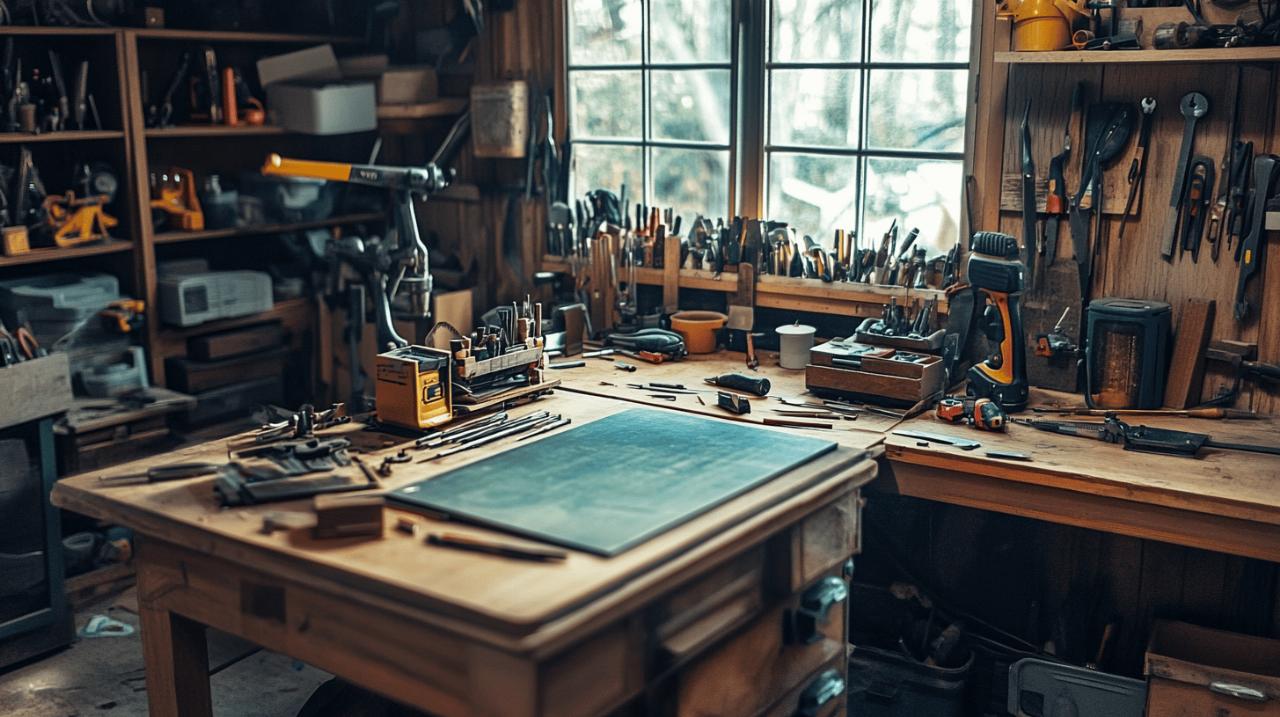Encountering a 'Page Not Found – Brico Deco' message can be incredibly frustrating when you're eager to crack on with your home renovation project. Yet sometimes, these digital dead ends can spark creative pathways to real-world solutions. Let's explore how to move beyond online disappointments and dive into the exciting world of DIY home improvements.
When digital dead ends lead to real-life makeovers
We've all been there – excitedly clicking through to find inspiration or materials for our latest home project, only to be greeted by that dreaded error page. Rather than letting this digital roadblock dampen your DIY spirit, consider it an opportunity to think outside the virtual box and explore tangible alternatives.
Turning online frustrations into diy inspiration
The momentary setback of a 'Page Not Found' message can actually redirect your creative energies. Perhaps the specific item or design you were searching for isn't available, but this opens doors to crafting something truly unique. Many spectacular home renovations have emerged from such unexpected detours, leading homeowners to discover their own inventive solutions rather than following prescribed patterns.
From error messages to brilliant home transformations
Consider keeping a physical inspiration notebook alongside your digital searches. When online resources fail, having a tangible collection of ideas, colour swatches, and material samples becomes invaluable. This old-school approach often yields more personalised results than following the same online templates everyone else is using. Your home should reflect your personality, not a carbon copy of what's trending on decoration websites.
Top-notch diy suppliers for your home projects
Finding reliable suppliers forms the backbone of any successful renovation project. While Brico Deco might be temporarily unavailable online, numerous other home improvement retailers offer excellent alternatives for your DIY needs.
Finding quality materials at reasonable prices
Quality needn't break the bank if you know where to look. Independent hardware shops often stock unique items that larger chains might not carry, sometimes at more competitive prices. These smaller establishments typically provide personalised advice from staff with practical experience – something no website can truly replicate. Building relationships with local suppliers can also lead to insider tips about upcoming sales or special orders.
Comparing What's on Offer from Different Home Improvement Shops
Each DIY supplier has its own strengths. Some excel in timber and building materials, while others might specialise in decorative finishes or bathroom fixtures. Taking the time to visit different shops allows you to assess product quality firsthand and compare prices across retailers. This research phase, though time-consuming, ultimately saves both money and potential disappointment with online purchases that fail to meet expectations.
Essential Items for Bathroom and Kitchen Renovations
Bathrooms and kitchens typically yield the highest return on investment when renovating. These functional spaces require careful planning and quality materials to ensure longevity and practicality alongside aesthetic appeal.
Heating solutions: from traditional to electric options
Modern heating options have revolutionised home comfort systems. Traditional radiators have evolved into stylish design features, while underfloor heating provides luxurious warmth without sacrificing wall space. Electric heating solutions offer flexibility for spaces where plumbing modifications would be prohibitively expensive. The right choice depends on your specific needs, budget, and the structural limitations of your property.
Delivery services that make life easier for diy enthusiasts
Gone are the days of struggling to transport bulky materials in unsuitable vehicles. Most suppliers now offer comprehensive delivery services, bringing everything from timber to tiles directly to your doorstep. This convenience factor cannot be overstated, especially for larger renovation projects requiring substantial quantities of heavy materials. Some retailers even provide timed delivery slots, allowing you to schedule arrivals around your working day.
Planning your diy shopping experience
Effective planning prevents the common pitfalls of home renovation – budget overruns, material shortages, and timeline slippages. Creating a structured approach to your shopping needs forms an essential part of this planning process.
Shop Hours and Locations in Rennes and Longpont
If you're based near Rennes or Longpont, you're fortunate to have access to several excellent DIY retailers. Each location has its own operating hours, with many now offering extended evening shopping on specific weekdays. Sunday opening has become increasingly common, though hours are typically reduced. Always check current opening times before making a special journey, as seasonal variations and public holidays can affect normal schedules.
Creating a Proper Timeline for Your Renovation Project
Realistic scheduling proves crucial for renovation success. Allow adequate time for material deliveries, which might take longer for special orders or custom items. Build contingency into your timeline for unexpected challenges, which invariably arise during home improvements. Breaking larger projects into manageable phases prevents your home from becoming an unlivable construction site, while providing satisfying milestone completions to maintain motivation throughout the renovation journey.
Building your diy confidence: tools and techniques
Getting stuck with a 'Page Not Found' message while searching for DIY supplies can be quite frustrating. Yet your home renovation journey needn't stall because of online hiccups. Whether you're planning to revamp your bathroom, modernise your kitchen, or simply add a bit of flair to your living space, having the proper knowledge about tools and techniques is essential for a successful project.
Many DIY enthusiasts across the UK find themselves visiting multiple shops to gather all necessary supplies. From local hardware stores to larger retailers, each offers unique selections that might be perfect for your specific needs. The key is knowing what you need before you start, which saves both time and money in the long run.
Heating solutions, for instance, come in various forms – from traditional radiators to modern electric systems. The choice depends on your space, budget, and personal preference. Similarly, bathroom fixtures range from basic functional pieces to luxurious designs that transform your washroom into a spa-like retreat.
Must-Have Tools for Beginners and Pros Alike
Every DIY toolkit should contain certain essentials regardless of your skill level. A quality hammer, set of screwdrivers (both flathead and Phillips), measuring tape, spirit level, and a decent drill will serve you well across numerous projects. For more specific tasks, consider investing in specialised tools like tile cutters for bathroom renovations or kitchen fitting kits when installing new units.
Many experienced renovators suggest starting with mid-range tools rather than the cheapest options. While budget-friendly tools might seem appealing initially, they often lack durability and precision, potentially leading to frustration and subpar results. A good rule of thumb: invest in quality for tools you'll use regularly, and rent specialised equipment for one-off tasks.
Most DIY shops offer tool rental services, which proves particularly useful for larger equipment like floor sanders or cement mixers. This approach saves money while ensuring you have professional-grade equipment when needed.
Mastering basic techniques for lasting results
Beyond tools, mastering fundamental techniques forms the backbone of successful DIY projects. Proper measuring and marking cannot be overstated – the old carpenter's adage of 'measure twice, cut once' holds true for a reason. Taking time to prepare surfaces properly before painting or tiling pays dividends in the final finish and longevity of your work.
When tackling plumbing tasks, understanding basic water flow principles and proper sealing techniques prevents leaks and future damage. Likewise, for electrical work, knowing when a job exceeds your skill level is crucial – some tasks are legally required to be completed by certified professionals.
Many DIY shops now offer workshops and tutorials, both in-store and online, providing hands-on experience under expert guidance. These sessions prove invaluable for learning techniques that are difficult to master from written instructions alone, such as plastering or proper grouting methods.
The most successful home renovators maintain a learning mindset, treating each project as an opportunity to build skills. Starting with smaller projects builds confidence before tackling entire room renovations, creating a solid foundation of practical knowledge that serves you throughout your DIY journey.
Making Your DIY Dreams a Reality: Tools and Techniques
Fancy giving your home a bit of a makeover? When starting any DIY project, proper planning and the right tools make all the difference between a stunning transformation and a DIY disaster. Whether you're revamping your bathroom, sprucing up the kitchen, or tackling a full-scale renovation, having a clear vision and the proper equipment will set you up for success.
Selecting the Right Tools for Home Improvement Success
Every DIY enthusiast knows that quality tools are worth the investment. Start with the basics: a reliable drill, a comprehensive screwdriver set, a sturdy hammer, and measuring equipment. For bathroom renovations, you'll need specialist items like pipe wrenches, tile cutters, and sealant guns. Kitchen projects might require jig saws for worktop cutouts and spirit levels to ensure your cabinets hang straight.
Don't skimp on materials either – premium fixtures, tiles, and fittings might cost more initially but will stand the test of time. Many DIY shops offer excellent value ranges alongside premium options, giving you flexibility based on your budget. Remember that heating solutions, whether water-based or electric, require particular attention to safety and quality.
Step-by-step approaches for stunning renovation results
Breaking down your project into manageable stages is key to achieving professional results. Begin with thorough preparation – clear the space, protect surrounding areas, and gather all materials before starting work. For bathroom renovations, tackle plumbing first, followed by tiling, then fixtures. Kitchen renovations typically flow from cabinets to worktops to appliances to finishing touches.
Consider delivery options for bulky items like bathtubs, shower enclosures or kitchen units – many shops now offer convenient home delivery services, saving you the hassle of transport. Keep track of opening hours if you need to visit physical shops during your project, as running out of materials mid-job can be frustrating. Taking your time with each step and not rushing the process will yield the most impressive transformation of your living space.




